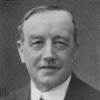Arthur Henderson

Arthur Henderson
Arthur Henderson PCwas a British iron moulder and Labour politician. He was the first Labour cabinet minister, won the Nobel Peace Prize in 1934 and, uniquely, served three separate terms as Leader of the Labour Party in three different decades. He was popular among his colleagues, who called him "Uncle Arthur" in acknowledgement of his integrity, his devotion to the cause and his imperturbability. He was a transitional figure whose policies were, at first, close to those of the Liberal...
NationalityBritish
ProfessionPolitician
Date of Birth13 September 1863
Arthur Henderson quotes about
The more the history of the World War and what led up to it is studied, the more clearly those tragic years become revealed as a vast collapse of civilization.
Four years of world war, at a cost in human suffering which our minds are mercifully too limited to imagine, led to the very clear realization that international anarchy must be abandoned if civilization was to survive.
I do not believe that the values which the Western democracies consider essential to civilization can survive in a world rent by the international anarchy of nationalism and the economic anarchy of competitive enterprise.
Whatever we do or fail to do will influence the course of history.
We had four years of world war which the peoples endured only because they were told that their sufferings would free humanity forever from the scourge of war.
The nations must be organized internationally and induced to enter into partnership, subordinating in some measure national sovereignty to worldwide institutions and obligations.
As a first step there must be an offer to achieve equality of rights in disarmament by abolishing the weapons forbidden to the Central Powers by the Peace Treaties.
Perhaps the grimmest aspect of this great paradox is that the very nations that are chiefly responsible for starting and for maintaining the Disarmament Conference are also the nations that have begun a new arms race.
The years of the economic depression have been years of political reaction, and that is why the economic crisis has generated a world peace crisis.
It is because I believe that it is in the power of such nations to lead the world back into the paths of peace that I propose to devote myself to explaining what, in my opinion, can and should be done to banish the fear of war that hangs so heavily over the world.
One of the first essentials is a policy of unreserved political cooperation with all the nations of the world.
The drive toward economic nationalism is only part of the general revival of nationalism.
The question is, what are we to do in order to consolidate peace on a universal and durable foundation, and what are the essential elements of such a peace?
The Disarmament Conference has become the focal point of a great struggle between anarchy and world order... between those who think in terms of inevitable armed conflict and those who seek to build a universal and durable peace.